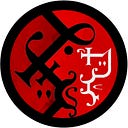EREBUS — Astor Lamia and the Rise of the Warmages
Major Arcanist Astor Lamia is the wizard in charge of the War Mage Cohort of the Erebus. He’s the highest ranking person without noble blood in the nation’s standing army: a demonstration of the infernals’ love for meritocracy and an example of its paradoxes.
After the wizards’ impressive performances on the battlefield of the Beasts’ front during the III Axam war, the prince-elector Nergal decided it was time to create a force of dedicated spell casters. Their main function would be to aid the troops with logistics and offer long ranges attacks, a sort of magical artillery and siege weapons.
The magic arts were evolved enough to be reasonably reliable: sure, sometime a wizard will blow up due to an unpredictable magical mishap, but the successes outweighed the cost of these incidents.
Wizards, on the other end, were not ready to become soldiers. Those who become arcanists usually have a calm and patient temperament, how could they otherwise stand the years-long training needed to cast their first spells? Wizards were conscripted and reluctantly pushed into the battlefield. After the war, many were left scarred by the experience and very few would try to enlist after the gruesome war tales of their older colleagues.
Astor Lamia is a wizard student of one of the few wizards that really found their home in the clashing of armies. His mentor, Zotoris, while horribly mutilated during the war, with various prosthetics compensating for his missing limbs and organs, was one of the most vocal proponents of War Magic. Zotoris led a squad of wizards to some great victories, his specialty, petrification, backfired on him multiple times but he always saw the resulting wounds as marks of bravery and honor.
The problem, he said, was that a wizard makes for an awful fighter: too much time over the books saps all the courage out of someone.
Astor took that to heart and decided to use the new and cutting-edge theories about magic knots to teach magic to everyone, even the not “arcanally inclined”.
The study of spell-casting insects offered a way to create extremely simple spells. Mixing this basic magic with the “blind” and discipline-focused approach of clerical and monastic magic, Astor was able to train his first squad. The spell was a variation on the “dragonfly knot”, a force dart shot from the point of the index finger. Nothing impressive per se, but giving soldiers a backup weapon equivalent to a hand crossbow with infinite munitions was deemed a promising result, considering also that the training took only six months.
The Prince’s son, Shamesh, tasked to develop magic use in the army, invested more and more in Astor studies and experiments. Astor gained the trust of the heir putting immediately to use all its advancement: he didn’t shy away from field missions and was the first to go into action.
After crushing some Beasts’ rebellion cells it was endowed with even more men and money.
To implement the power of the spells without making them more complex Astor looked at making better tools: he made wands inspired by dwarven rifles and looked for helpful material to create the uniforms.
A WarMage can’t be considered equal to a wizard, a true spellcaster is much more versatile and can achieve greater effects, but, in specific scenarios, military spell casters can get toe-to-toe with “true” magic users, and all with a training time five times shorter.
Now Astor has the rank of Major Arcanist, a rank created just for him.
He sits at the war council and talks to dukes and counts as a peer about any martial matter. He is the only commoner there: normally only aristocrats (and therefore blessed with the blood of devils) are high-rankling officials: it’s the honor and burden of nobility.
But Astor created a way for a commoner to make a career in the army that could reach the top. Erebusian nobles saw what happened elsewhere in the Empire: rich merchants weaseled their way into other nations’ armies, causing friction and eroding aristocratic privileges. They probably don’t understand this consciously but they feel deep down that this will cause problems: how can a system based on merit have limits based on birth? Why, at some point, Astor could be stopped to become a general? And after that, maybe even a title?
But nobody knows how to manage the rise in rank of the Major Arcanist: assassination would be the obvious solution, but everybody fears the vengeance of the War Mages: they are extremely loyal to their corp and their leader. Astor offered sophisticated cures and prosthetics to everyone injured during their experimental training. Since Astor always took care of his troop the troupe will not see kindly anyone hurting him.
